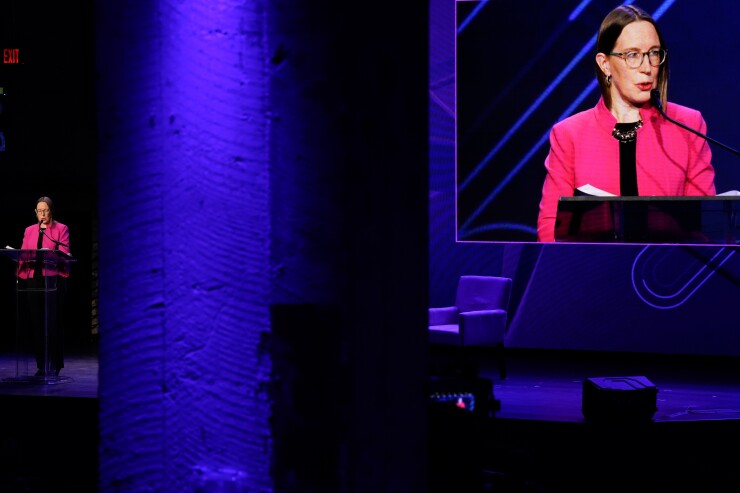
SEC Commissioner Hester Peirce said innovators feel constricted by regulatory rigmarole to the point that they feel like they're being put in "straightjackets" trying to comply with regulations.
"It's sad," Peirce, who leads the SEC's crypto task force, said. "I get up and I look around and I think the things that cause people stress today are not about the basic questions of life, it's about whether I filled out the right form or crossed out the right thing off the regulatory checklist, and that is really sad. That is not a way for us to live."
Speaking at the Decentralization Research Center Tech Summit Wednesday in Washington, D.C., Peirce said the
"We need to really be thinking about ways that we can
"My regulatory colleagues are very well intentioned — and my point is not to suggest otherwise — it's just to say that the imagination and creativity that drives prosperity does not come from government regulators, it comes from people who are freely out there trying to experiment and try new things," Peirce said. "We've got to figure out a way that we can put reasonable protections in place, but not stifle that creativity and ingenuity."
She said part of her frustration stems from the fact that "the SEC's approach really has been so haphazard that it's made [her] nervous that we won't be able to come to a clear approach." Peirce is the longest serving commissioner at the SEC, having been appointed by President Donald Trump in his first term in 2018. She was confirmed by the Senate for a second term by voice vote in 2020. Dubbed
She is one of several crypto enthusiasts Trump appointed to key positions upon taking office. Once a crypto skeptic, Trump has
Trump
"I think that roundtable helped give me confidence that we actually can come to something," Peirce said. "I'm not saying that I have the exact way forward, but I think we can come to something based on that feedback and other feedback we're getting."
Banks can now engage in crypto without Federal Deposit Insurance Corp. approval, part of a broader Trump-era deregulatory push to integrate digital assets into traditional finance.
Peirce encouraged participants at the event to think of what it would be like if the SEC tests were applied to everyday products. She used the example of athletic sneakers which some people buy to use to exercise but others buy because they see value in the design or believe that others will and they can resell the pair for a profit.
"If we apply these same tests to products that companies sell tangible products, would we come to the same conclusion? Would we come to the same conclusion about whether something's a security or not a security?" Peirce said. "If you're selling shoes – lots of people think that there's value in athletic shoes in addition to being able to run in them. There's some status symbol aspect of a shoe, and you can trade shoes on secondary markets. At what point do we say the shoe is a security? I think whatever tests we develop for crypto, we have to remember could be applied in other places."
In addition to that, Peirce pointed to the SEC's recent statement on meme coins as an example of how not everything within the crypto space falls under the SEC's jurisdiction.
"We put out a statement on meme coins saying a lot of these offerings are not within our space, but that doesn't mean that people aren't going to get hurt if they buy into these and it doesn't mean that there might not be another regulator who has authority there. It's just saying we don't," Peirce said.
"I would say just because something bad is happening, doesn't mean the SEC has jurisdiction, and that's not always a popular view, but I think that's the reality," Peirce said. "We have been reminded repeatedly by courts that we have to stay within the jurisdiction that Congress gave us, and if Congress wants to give us broader authority, that can happen, but we have to stick it within the corners they think is fair."
Furthermore, just because the SEC decides to approach an issue like safe harbor requirements one way, does not mean it's always the best way, Peirce said. She stressed that under her purview she was open to hearing other ideas.
"One thing to remind people is, if we come out with the safe harbor, the safe harbor is not the only way to do things; it is a way to do things," Peirce said. "I always encourage people to come in and talk to us if they have a different approach to doing things.
"If we come out with guidance to say, 'XYZ activities work best,' we look at and it's not within the securities laws, and you say, 'Well, what about X, Y, Z, plus one? Why aren't you saying that's carved out also?' Well, come in and talk to us about that," Peirce said. "There may be more nuance and complexity and we wanted to get something simpler out first, but that doesn't mean we wouldn't consider something broader. Just view this as an iterative exercise for a lot of these things."






